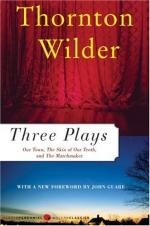|
This section contains 829 words (approx. 3 pages at 400 words per page) |
Soliloquy
A soliloquy is the speech a character gives directly to the audience, either when alone on the stage or else ignoring the other characters, who cannot hear it. Wilder has several characters give soliloquies in The Matchmaker. In the first act, after everyone else has gone and left him alone, Vandergelder talks at length about why he wants to be married now. These are personal thoughts that he would not share with any of the other characters; he may explain his theory of marriage as a way to get a decent housekeeper, but the idea that he is willing to take a chance is too personal, and sharing it would leave him too vulnerable. He ends his soliloquy by acknowledging that he is talking to an audience, telling them, "Think it over."
Cornelius gives a soliloquy in act II, when he and Barnaby are supposed to be hiding. His speech explains how wonderful he feels, having fallen in love. These are ideas that Barnaby has shown himself unable to understand, and Cornelius certainly could not tell them to anyone else.
In act III, Malachi tells the audience his theory about the need to have one vice but no more than one. His ideas are relevant to the play in general, but, again, they would not fit into the dramatic scene because they represent things that Malachi, a relative newcomer, would not explain to anyone else there.
Dolly Levi's soliloquy in the final act is addressed to the memory of her dead husband rather than to the audience. Since the subject is remarriage, she would naturally think of him, but as a dramatic technique this is handled in the same way as the other soliloquies.
Barnaby's speech at the end takes off from the earlier soliloquies. In them, characters talked to the audience, but they never acknowledged the audience to one another. In the play's final moments, though, Mrs. Levi drops the pretense that usually separates players from audiences, acting like a mutual friend who is introducing Barnaby to the audience and vice versa.
Subplot
If this play's main plot is the strange courtship between Horace Vandergelder and Dolly Levi, then the other two romances would have to be considered subplots. Either one could be removed without substantially changing the whole play. Ermengarde and Ambrose do give Vandergelder a chance to show off his intolerance and autocratic nature in the beginning, but that could have been handled in any number of other ways. For most of the play, the young lovers are gone, signifying their relative unimportance. On the other hand, the blossoming romance between Cornelius Hackl and Irene Molloy takes up most of acts II and III, at times becoming more important than Vandergelder's story, Still, all that this romance really adds to the plot is that it removes Mrs. Molloy from the pool of available wives and gives Cornelius a chance to expound upon how good it is to take a chance.
Another way to look at it, however, is that these are not subplots at all. They are only subplots if the story of Vandergelder and Mrs. Levi is considered the one main plot. The Matchmaker is not necessarily their story, though. It is a story about love, and as such each of the three variations on the theme of love is as important as the others, regardless of how colorful the characters are or how much time they spend onstage.
Denouement
Denouement is a French word that means "the unraveling." In literature, it is used to describe the action that happens after the story has reached its climax. In The Matchmaker, the final few pages clearly are there to tie up loose ends. The play does not end with action but with Barnaby coming in from the kitchen bringing news. Before that comes Vandergelder's proposal to Mrs. Levy, but even that seems to be a necessary but minor afterthought: from the fact that he calls Dolly "wonderful woman" and lets her keep his purse, audiences can tell that he has already changed his character. Even Dolly Levi's speech to her dead husband does not represent any advance in the plot but just a clarification of the principles she has been following all along.
A good case can be made for the idea that the climax of the play occurs when Vandergelder's pretensions are finally put to rest at the end of act III. Mrs. Levi explains very clearly that he has lost everything: his niece, his bride, his clerks, and even his money. This seems to have no effect on Vandergelder, as he still refuses to marry her, but the next time he shows up on stage he is humbled. He allows Mrs. Van Huysen and Mrs. Levi to give him orders and behaves civilly at their request. Once Horace Vandergelder allows others to tell him what to do, the rest of the play is just a matter of clearing away leftover plot elements.
|
This section contains 829 words (approx. 3 pages at 400 words per page) |




